Lux Aeterna (2019)
Directed by: Gaspar Noé
Written by: Gaspar Noé
Starring: Abbey Lee, Beatrice Dalle, Charlotte Gainsbourg, Claude-Emmanuelle Gajan-Maull
FRANCE
AVAILABLE ON LIMITED EDITION BLU-RAY: 30TH MAY, from ARROW FILMS
RUNNING TIME: 53 mins
REVIEWED BY: Dr Lenera
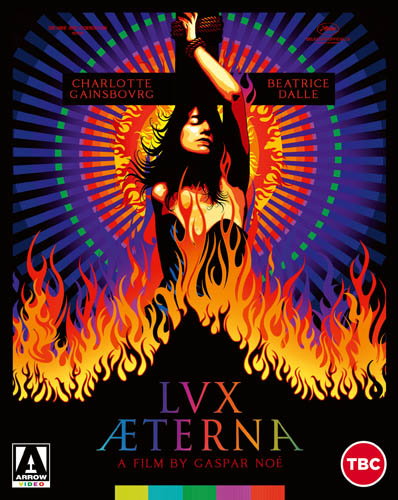
Real-life actress Charlotte Gainsbourg is playing a witch in a film called God’s Work which is directed by real-life actress Béatrice Dalle. It’s the morning of the part of the shoot which will film the burning at the stake of Gainsbourg’s character, and things are heating up. Gainsbourg is trying to dodge a young first-time director who wants her in his movie as well as try to solve a crisis involving her daughter at school. The producer and cinematographer are conspiring to fire Dalle and recruit the set photographer to follow and record her every move, hoping she’ll slip up. Another actress is being asked to perform topless without contractual agreement. A critic keeps asking for quotes from the various crew members. And then things get much worse….
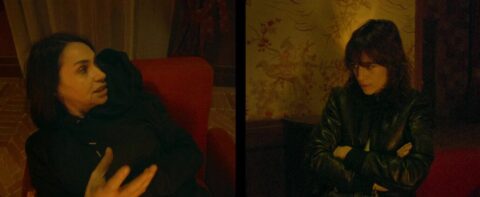
I find it quite hard to describe the work of Gaspar Noé to the uninitiated, and even harder to recommend it. After all, this is a filmmaker who’s primary aim often seems to be to assault the viewer. Yet I’m also a huge admirer of this director who seems to have created a style, a look, a feel and an attitude all of his own, yet who’s also able to make each new film notably different from the one that came before. Noé’s movies take place in a sometimes hard to like but also hard to look away from and certainly hard to ignore world of nihilism, anxiety, sexuality and aggression, a world which tends to exist in a drug-fueled haze yet which is able to reach fundamental and raw human truths, a world which is both naturalistic and borderline surreal, sometimes, incredibly, at the same time. Our friends at Arrow Films are releasing two of his works, one for the first time, seemingly to coincide the cinema release of his latest film Vortex which actually looks like it something of a big change of pace for Noé – yet I’m sure I won’t be able to stop thinking about it afterwards even if I don’t like it. Unfortunately though it’s not on near me. I’ll also be Enter[ing] The Void via Arrow’s improved Blu-ray re-release, a film which I just haven’t been able to decide on in all sorts of ways – though hopefully I’ll now be able to do that. But for now we have Lux Aeterna, which began life as a fifteen-minute advertisement for Saint Laurent, then metamorphised into something that’s somewhere in between a short film and a feature film. Shot chronologically and virtually made up as they went along, the result is pure Noé and actually veers on becoming self-parodic, which will please some fans and not others, I guess. But that and it’s short running time are enough for me to consider suggesting it to any readers who are Noé virgins yet who want a taster before they decide whether to properly dive in or not.
A few days ago I watched The Birds for the umpteenth time and recalled once again reading how Alfred Hitchcock literally tortured star Tippi Hedren on set when, while filming the final set piece where her character is savagely attacked by birds in a loft [why she goes up to that loft in the first place I’ll never work out], he got people to literally throw birds at her time and time again. I don’t really know how Noé developed his thoughts on making Lux Aeterna, but it seems to me that this kind of thing was one of the starting blocks for what it became, even if it may not be how it really begins, nor even ends [I’m probably not always making much sense here, but this is a Noé film after all]. The history of the cinema is full of tyrannical directors, but it seems that women often bore the brunt of what most of them would say was the creation of art. Noé’s other main inspiration seems to be the MeToo movement which at the time was taking somewhat longer to get results in France than many other countries. He looks at life on a film set in general with his unique eye and mind which ensures that there’s certainly enough differences from the other films with this setting that you will have seen, but is especially interested in how women are still kept “in their place” and perhaps not just on film sets. Importantly though, you get no sense of being lectured to. And he introduces a new favourite technical device which, judging by what I know about Vortex, is his current favourite. The up and down swooping camera is old hat by now and the camera that duck and dives in and out of conversations for extended periods is no longer such a big deal. Now it’s that old chestnut split screen, and nearly all of the time, though Noé does all he can to make it seem fresh and exciting. Confusion may very well be the first reaction for a while, but eventually I got happily used to it.
Opening words about how wonderful it would be to experience the great feeling that one has just before an epileptic fit may seem to a cheap attempt to shock but are actually a quote from Fyodor Doestovsky, though I doubt that the next couple of minutes of credits over a flickering orb that constantly changes colour come anywhere near close. Then there’s some footage from the black and white film Haxan of a man selecting a torture implement and going into a room where a woman is tied down, followed by a quote from Jean-Luc Godard: “Filmmakers have to raise the industry to an art form”, before footage from another film which turns out to be Day Of Wrath [another enticing clip from which I’d only seen a week ago whilst exploring the special features on Eureka Entertainment’s new Blu-ray release of director Carl Dreyer’s extraordinary Vampyr], including a quite shocking shot of a woman falling into flames. And then – the film proper starts, and one of those lengthy, mostly improvised conversations that Noé likes while the camera remains entirely stationery. They are, of course, Charlotte and Béatrice, and they discuss the burning of witches, including the fact that both of them have cut ear lobes which used to be considered a sign of being a witch in a woman, not to mention the awful fact that, to identify a witch, she would be drowned; if she survived, she was a witch, if she didn’t, she wasn’t. Other topics are also covered including being naked during filming while surrounded by a huge number of men, being made to look sexier on the stake, having some connection with Jesus despite not being a believer because Jesus doesn’t comment on bad things that are done, and – um – being ejaculated on, which puts in our minds that maybe doing sex scenes isn’t always a very un-erotic experience. Well, this is Noé, while I also know from experience that the French tend to be considerably more frank about such matters. Dalle tends to lead the conversation which cuts away just as it verges on outstaying its welcome.
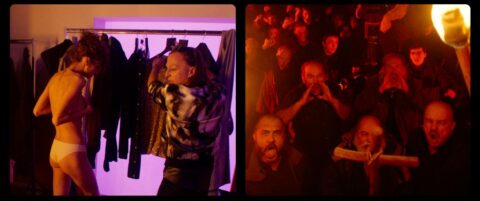
Dalle’s boyfriend Felix then turns up with another guy named Karl who’s eager to talk to Gainsbourg but only because he wants her to be in his film. But Dalle is wanted out by people who have another director ready to take over, while Gainsbourg has a daughter who’s being bullied [I’m sure I’m not the only one who had to look up what “foo foo” was]. And then there’s also Abbey, another actress. It seems to be assumed that she’ll go topless even though it’s not in her contract, while she and another are being filmed in that state anyway. But Noé never makes his look at the treatment of women on movie sets become dominant or turn his film into a load of preaching. After all, God’s Work is “A dreamlike movie, it’s not politics it’s poetry”. I’m not sure that Lux Aeterna can be called poetry, but its descent into chaos, as the actors, crew, and paparazzi crowding the set of God’s Work get increasingly at each other’s throats, is well managed and seems convincing even though we don’t care as much as might because there hasn’t been enough time for characterisation except for maybe our two chief ladies. And then Noé does his best to make good on the promise of the Dostoyevsky quote we saw at the beginning, while also seeming to reference/homage 2001: A Space Odyssey yet again. I’m not going to tell you what exactly happens in terms of the plot, but I’m going to warn you that the image gradually dissolves into a stroboscopic onslaught of neon colours accompanied by a high pitched ringing and a thundering drone which gets more and more intense. Some may not be able to stand it, some may just be bored, and I can’t say that I particularly liked it, but I stuck it out, and eventually I was in a trance-like state. I’m assuming that’s what Noé intended, but who really knows?
What’s perhaps even more interesting is that, without again giving much away, while the climax does indeed clearly refer to the way many directors have treated women on sets, the cause of the bizarre thing that happens isn’t the fault of Dalle, unless there’s something that’s been majorly hidden from us. Dalle is, from what little we see, clearly the character who’s most troubled, and her behaviour, which even includes hitting the point of view of the viewer as if he or she is the one filming her, suggests that those who want to fire her may be partly justified, even if the way that they’re going about things isn’t very ethical. Yet the madness that takes over seems more external as a whole, meaning that it’s possible to take the line that Noé is in some way trying to excuse cruel filmmakers who torment their leading ladies. I personally doubt that Noé intends that interpretation at all; he’s probably just saying how the pressure and chaos of filmmaking can get out of hand but a magical force usually [but not here] ensures that the film is completed before things get too bad. He reigns himself in with the lack of sex and violence unless you count the sight of a mutilated torso with only the penis intact, though there’s the usual extremely bright lighting, the studio begin a maze of neon-lit red or green corridors leading to drab rooms. High and mighty quotes from great filmmakers in medieval-style type face and some semi-referencing of other Noé proves that his wry humour is still around and maybe more present than usual, while the whole thing is really quite close to his previous work Climax; obviously some of the same ideas were floating around in Noé’s head. And, while that film’s allegorical elements aren’t as to the fore, the world is a film studio of a sort. Then there’s another off-kilter soundtrack, this time comprising of synthesiser versions of well known classical pieces, and playing more like music playing on a device in the background than an actual score. The first one we hear is the Second Movement of Mahler’s Second Symphony, immortalised in Death In Venice. Seeing as it’s one of my favourite pieces of music, you’d think I’d be squirming, but it really wasn’t bad at all. The final piece, Chopin’s Funeral March, is played backwards. As you do.
The most potentially annoying element is undoubtedly employed masterfully. Sometimes different people employ different sides, sometimes both sides are virtually the same. As things get crazier, the split screens appropriately become more and more independent with cinematographer Benoit Debie’s steadicams pursuing two sets of characters, and following one thread may make you momentarily lose track of the other, especially when two conversations, one in French, and one in English, are taking place. Noé still likes to aggravate, yet on the whole Lux Aeterna seems to be mostly a bit of a lark, a lark with serious themes yes, but with a clear tongue in cheek element even though it never becomes an actual comedy. It’s main flaw is that it still seems like a project that hasn’t been fully realised, a short version of a feature film soon to be made. Some aspects remain largely undeveloped and the finale comes far too soon. Gainsbourg, Dalle and Abbey Lee are all fine, but the other performances tend to be so-so, even the ones by professional performers. But even not fully realised Noé is still crammed full of interest and couldn’t have been made by anybody else in the world. Lux Aeterna remains much better than his curiously misjudged Love. Today’s cinema still cries out for more artists like him.
High Definition Blu-ray (1080p) presentation
Lux Aeterna was only going to look eye-popping on Blu-ray, but take the warning about strobe lighting at the beginning seriously; it really is extreme in the last ten minutes.
Original lossless DTS-HD Master Audio 5.1 and PCM 2.0 stereo soundtracks
Optional English subtitles (French dialogue)
Optional English subtitles for the deaf and hard of hearing (all dialogue)
Brand new audio commentary by writer/director Gaspar Noé and actress Béatrice Dalle
This loose and frank chat might be the best – or at least the most enjoyable – audio commentary I’ve heard in a long while. The two don’t even introduce themselves, but why should they? Dalle’s very early comment “I think we should bring back antiquarian torture, I swear, it’s all so sexy” virtually sets the tone. Even the talking over the first scene is full of nuggets, from Noé saying that he always begins shooting of his films at 2am so the actors aren’t “fresh”, and not telling actors what part they were playing until the first take ,to Dalle going to a hospital where three people had gouged their eye out after seeing Betty Blue, and most of the stories she and Gainsbourg tell being based on real experiences. Throughout, incisive commentary on scenes alternates with production information [they shot in already built sets which they didn’t change] and just shooting the breeze. Dalle even defends despot directors. Fabulous stuff.
Brand new audio commentary by author and critic Kat Ellinger
As one might expect, Ellinger has a field day discussing this particular film which she sees as being inspired by Kenneth Anger and Antonin Artaud’s Theatre of Cruelty, and goes greatly into subtext and feminist aspects. I must admit I’d never thought of Noé’s work having feminist elements in general, but she puts forward a very good case, the films all having “women being punished for having their own agenda“, though she also humbly states that she’s only saying what she thinks Noé means, Noé himself not having said much on the subject so far. We also hear more about the project’s conception and even have music videos called an artform which hasn’t been given enough respect. I concur.
Lux in Extremis: a brand new visual essay on the film by author and critic Miranda Corcoran [21 mins]
Corcoran covers a fair bit here, though the main theme is torture, beginning with a description of Noé’s work which often seems to torture the viewer, torture’s use in the Middle Ages to supposedly identify witches, then going on to films about this which often fall into the trap of exploiting its subject for our gratification, before relating Lux Aeterna to the subject, which she sees as “a meditation on torture and suffering”. The explanation for all that medieval torture – an innocent person would have the strength to withstand torture and therefore wouldn’t wrongly confess – is mind boggling. Corcoran sees MeToo as the dominant motive to make the film. This would have benefited from being longer – but than that’s kind of appropriate.
The Flicker: a 30-minute short film by Tony Conrad, whose strobing effect inspired Lux Æterna
Now this takes some sitting through. A warning is followed by two drawings, one a strange adaptation of some letters and numbers, one seemingly entirely abstract – and then it’s a flickering white screen for the rest of the running time set to a whirling noise. The rates of the flickers change but that’s really about it. I’ll be honest and admit that I didn’t see anywhere near all of it. One day I might and get very high as a result.
Lux in Tenebris: a selection of photos from the set by camera operator, title designer and long-term Noé collaborator Tom Kan [6 mins]
These are briefly speed up so the picture flickers towards the end
Theatrical trailers
Image gallery
Reversible sleeve featuring two choices of artwork
FIRST PRESSING ONLY: Illustrated collector’s booklet featuring new writing on the film by Neil Mitchell
Noé manages again to create a unique piece of cinema that might be his purest work, even if it seems far too short. Arrow’s Blu-ray does it justice with its special features. Recommended.





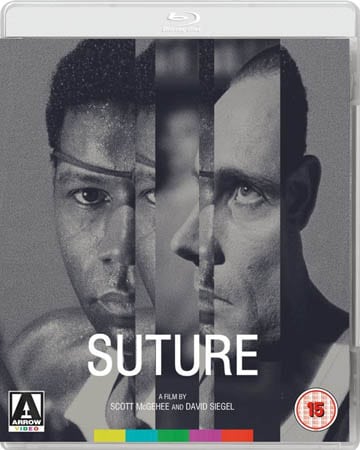

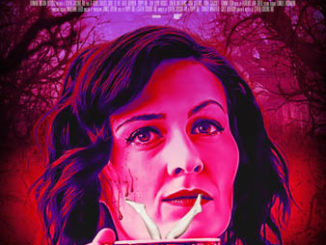
Be the first to comment